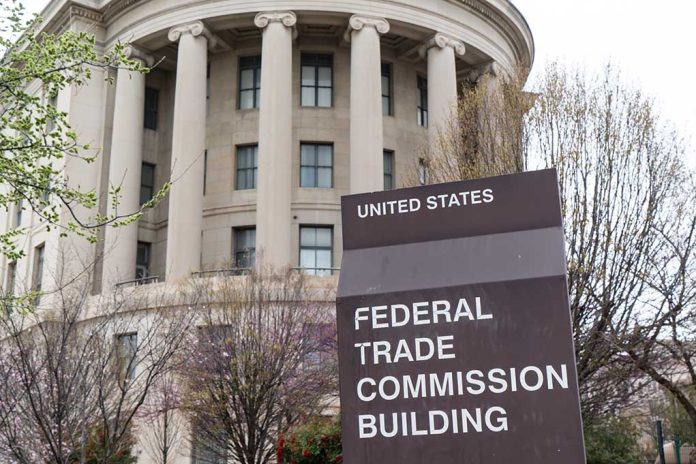
Federal Trade Commission exposes shocking drug price markups by pharmacy benefit managers, sparking calls for reform.
At a Glance
- Top three pharmacy benefit managers generated $7.3 billion through drug price markups over five years.
- Some specialty drug prices were inflated by over 1,000%.
- Cancer drugs accounted for nearly half of the markups.
- FTC report criticizes preferential treatment given to PBM-affiliated pharmacies.
- Bipartisan congressional support for addressing PBM practices.
FTC Reveals Alarming Drug Price Markups
The Federal Trade Commission (FTC) has dropped a bombshell report exposing the alarming practices of pharmacy benefit managers (PBMs) in the United States. These middlemen, responsible for negotiating drug prices between manufacturers and insurers, have been caught red-handed inflating the costs of life-saving medications to astronomical levels. The report focuses on the three largest PBMs – CVS Health’s Caremark Rx, Cigna’s Express Scripts, and UnitedHealth Group’s OptumRx – which together control up to 80% of U.S. prescriptions.
According to the FTC’s findings, these PBMs generated a staggering $7.3 billion through drug price markups over a five-year period starting in 2017. The markups were particularly egregious for specialty drugs, including those used to treat cancer, heart disease, and HIV. In some cases, the price hikes exceeded 1,000% of the national average, leaving patients and insurers to foot the bill for these inflated costs.
For the second time in less than a year, the FTC has released a highly critical report of pharmacy benefit managers, or PBMs. https://t.co/XSM1LbSgn8
— STAT (@statnews) January 14, 2025
Impact on Patients and Independent Pharmacies
The FTC’s report paints a grim picture of how these practices affect American patients. Specialty drugs, particularly those used to treat cancer and multiple sclerosis, were significant contributors to the $7.3 billion in markups. Cancer drugs alone accounted for nearly half of this amount, highlighting the dire consequences for patients already grappling with life-threatening illnesses.
“The FTC staff’s second interim report finds that the three major pharmacy benefit managers hiked costs for a wide range of lifesaving drugs, including medications to treat heart disease and cancer” – FTC Chair Lina Khan
The report also sheds light on the plight of independent pharmacies, which claim they are being unfairly squeezed by low reimbursement rates due to these practices. The FTC found that PBMs reimbursed their affiliated pharmacies at higher rates than unaffiliated ones for specialty generic drugs, further undermining competition in the pharmaceutical market.
PBMs’ Response and Ongoing Investigations
Unsurprisingly, the PBMs have disputed the FTC’s findings. CVS Health called the conclusions “inappropriate and misleading,” while OptumRx highlighted patient savings. Express Scripts has gone a step further by legally challenging the FTC’s claims. However, these rebuttals have done little to quell the growing concern over PBM practices.
The FTC’s investigation suggests that PBMs may be directing prescriptions to their own affiliated pharmacies, contributing to high drug prices. This practice, along with others highlighted in the report, has prompted ongoing legal actions against the top PBMs for alleged anticompetitive practices. FTC Chair Lina Khan has emphasized the need for continued investigation and swift action against any illegal conduct by the PBMs.
Bipartisan Support for Reform
The FTC’s revelations have garnered bipartisan support in Congress, with members from both sides of the aisle calling for reform. Senators Josh Hawley and Elizabeth Warren, along with Representatives Jake Auchincloss and Diana Harshbarger, have voiced their concerns and support for addressing PBM practices. This rare showing of bipartisan consensus underscores the urgency of the issue and the potential for meaningful legislative action.
As the healthcare industry grapples with these findings, it’s clear that the role of PBMs in the pharmaceutical supply chain needs to be reevaluated. The FTC’s report serves as a wake-up call for policymakers to address the alarming rate of drug price inflation and improve healthcare accessibility for patients dependent on these life-saving medications. With continued scrutiny and potential reforms on the horizon, there may be hope for a more transparent and fair drug pricing system in the future.
Sources:
- Top three insurers reaped $7.3 billion through their drug middlemen’s markups, FTC says
- FTC alleges PBMs cost consumers $7.3 billion marking up drug prices
- Pharmacy Benefit Managers Marked Up Specialty Drugs By Over 1,000%: FTC Report




